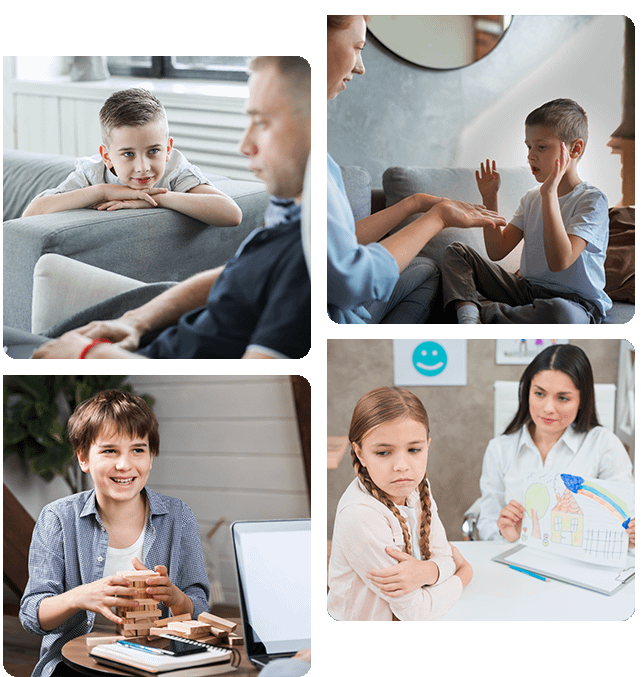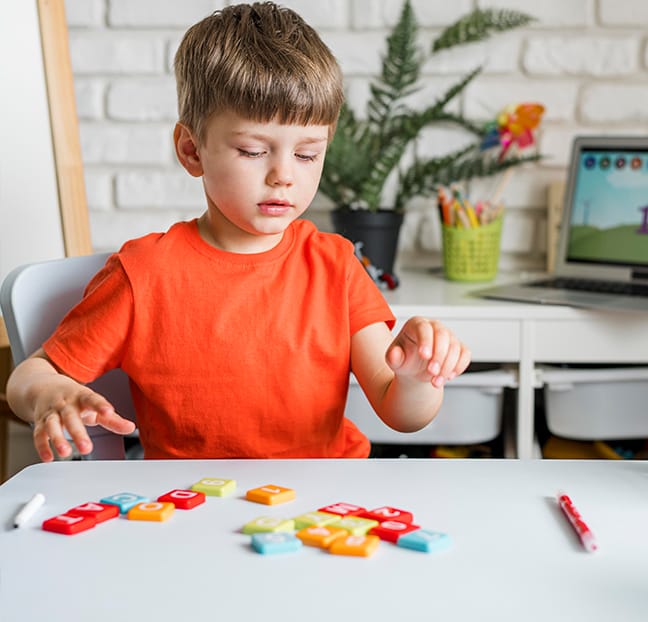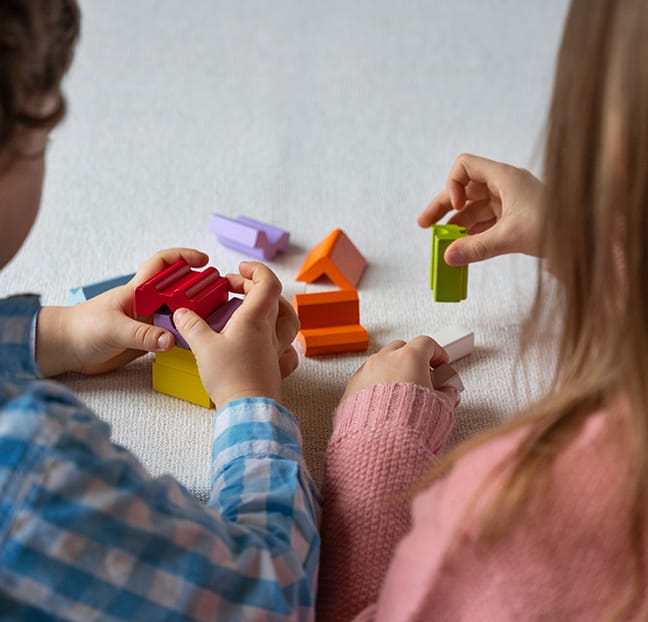
Emotional Regulation Therapy
Book An Appointment For Intake Session / Consultancy / OPD charges Rs. 1000/- only
Connect With Us For The Consultancy
Embrace Your Emotions, Master Your World: The Journey of Emotional Regulation Therapy.
What is Emotional Regulation Therapy?
Emotional Regulation Therapy is a specialized therapeutic approach that helps individuals manage or control their emotions in a way that is highly effective. It is the type of therapy that can be learned at any age. The treatment for children focuses on developing emotional intelligence and coping strategies through play-based techniques and creative activities. Adults receive therapy that builds on their current emotional foundations, addresses specific issues and triggers, and employs mindfulness and cognitive-behavioral strategies. The ultimate goal is to foster emotional resilience, improve well-being, and cultivate inner balance and harmony, empowering individuals to navigate life's challenges with greater emotional intelligence.

Inspire for Better Living…
Let’s Connect!

The Mechanisms Behind Emotional Regulation Therapy
- Incorporates evidence-based techniques and interventions.
- Helps individuals identify and understand their emotions more effectively.
- Teaches coping skills to manage and regulate intense emotions.
- Encourages mindfulness practices to increase emotional awareness.
- Addresses triggers and patterns of emotional reactions in different situations.
- Promotes adaptive responses to stress, conflicts, and challenging circumstances.
- Uses cognitive-behavioral techniques to modify thought patterns and behaviors.
- Empowers individuals to express emotions in healthy and constructive ways.
- Nurtures emotional resilience and flexibility.
- Enables individuals to experience enhanced emotional well-being and a sense of inner balance.
Transformation & Wellness Clinic's Impactful Emotional Regulation Therapy
-
Attaining Inner Equilibrium: Transformation & Wellness Clinic's Emotional Regulation Therapy empowers individuals to achieve emotional harmony and find inner balance.
-
Fortifying Emotional Resilience: The therapy, which is based on evidence-based practices, builds emotional resilience, giving you the confidence to face life's problems.
-
Embracing Emotional Intelligence: ERT fosters emotional intelligence, enabling clients to understand, manage, and express emotions healthily and constructively.
-
Cultivating Mindful Self-Awareness: The therapy encourages the exploration of emotions with mindfulness, helping individuals identify triggers and patterns of emotional reactions that are hindering their ability to function.
-
Promoting Adaptive Responses: ERT promotes adaptive responses to stress, conflicts, and powerful emotions, hence encouraging good behavioral changes.
-
Empowering Coping Proficiency: Clients acquire effective coping strategies to regulate emotions, elevating their overall emotional well-being.
-
Embarking on Personal Growth: TWC's ERT provides the person with an amazing insight into yourself that will lead to direct positive results and improvements.
-
Guided by Expert Practitioners: Our experienced therapists provide expert guidance, tailor interventions, and create a supportive environment for successful therapy outcomes.
-
Unleashing Untapped Potential: Emotional Regulation Therapy helps people reach their greatest potential, allowing them to thrive in all aspects of life.
-
Charting the Path to Emotional Mastery: Emotional Regulation Therapy assists people in reaching their full potential and thriving in all parts of life.

Essential Elements of Emotional Regulation Therapy
Embracing Calm: Emotional Regulation Therapy for Anger Management.
Identifying Triggers
Helping individuals recognize the specific triggers that provoke anger responses.
Enhancing Communication Skills
Improving communication skills to express feelings and needs assertively.
Understanding Anger
Helping clients comprehend the root causes and patterns of their anger.
Stress Management
Introducing stress-relief techniques to reduce overall anger levels.
Coping Mechanisms
Equipping individuals with coping mechanisms to handle anger-inducing situations constructively.
Positive Behavioral Changes
Encouraging adaptive responses to anger, leading to positive behavioral transformations.
Developing Empathy
Empathy is developed to improve awareness of the opinions and emotions of others.
Long-Term Emotional Well-Being
Providing tools for sustained emotional regulation and overall well-being.
Emotional Regulation Therapy
Book An Appointment For Intake Session / Consultancy / OPD charges Rs. 1000/- only
Connect With Us For The Consultancy
The Transformative Role of Emotional Regulation Therapy in Managing Anxiety
-
Understanding Anxiety: Assisting people in understanding the sort of anxiety and its influence on emotions and behaviours.
-
Emotion Regulation Techniques: Teaching evidence-based techniques to regulate anxiety and prevent it from overwhelming the individual.
-
Mindfulness and Relaxation: Incorporating mindfulness practices and relaxation exercises to reduce anxiety's intensity and promote calmness.
-
Cognitive Restructuring: Assisting individuals in challenging and reframing negative thought patterns associated with anxiety.
-
Stress Management: Providing effective stress-reduction tactics to help people cope with anxiety in a variety of situation.
-
Exposure and Desensitization: Gradually exposing individuals to anxiety-provoking situations to build resilience and reduce avoidance.
-
Embracing Uncertainty: Cultivating acceptance and coping mechanisms to manage the uncertainties that trigger anxiety.
-
Supporting Coping Skills: Equipping individuals with adaptive coping skills to navigate anxiety-inducing challenges.
-
Long-Term Well-Being: Empower clients with the tools to sustain emotional regulation and manage anxiety for lasting well-being.
Emotional Regulation Therapy for anxiety management is a transforming journey that empowers people to take responsibility of their emotions and reclaim control of their life in the face of anxiety-provoking situations.
The Efficacy of Emotional Regulation Therapy in Controlling Frustration.
-
Emotion Identification: Assisting children in recognizing and labeling frustrating emotions, fostering emotional awareness.
-
Coping Skills Development: Equipping children with age-appropriate coping strategies to manage frustration effectively.
-
Emotional Expression: Encouraging children to express their frustrations in healthy and constructive ways.
-
Breathing and Relaxation Techniques: Teaching simple breathing and relaxation exercises to help children calm down during moments of frustration.
-
Problem-Solving Skills: Providing children with tools to identify the source of frustration and find constructive solutions.
-
Positive Reinforcement: Acknowledging and rewarding children's efforts in applying emotional regulation skills to reduce frustration.
-
Empathy and Perspective-Taking: Encourage children to grasp the perspectives of others, cultivate empathy, and reduce irritation in social interactions.
-
Social Skills Enhancement: Incorporating social skills training to improve emotional regulation and reduce frustration in social settings.
-
Art and Play Therapy: Utilizing creative outlets like art and play to help children express and cope with frustrating emotions.
-
Parent/Caregiver Involvement: Collaborating with parents/caregivers to support and reinforce emotional regulation techniques at home, promoting consistency and progress.
Recipients of Emotional Regulation Therapy and Their Journey to Inner Harmony.
-
Empowering Emotional Discovery: Emotional Regulation Therapy allows children to deal with their emotions while also developing emotional intelligence and self-awareness.
-
Navigating the Rollercoaster of Emotions: The therapy prepares children to properly regulate their emotional highs and lows through engaging activities and entertaining strategies, developing resilience.
-
Expressing with Creativity: Art and play therapy become expressive outlets, allowing children to communicate and process emotions in a fun and imaginative manner.
-
Building a Safe Haven: The treatment fosters a deep sense of trust with the therapist by providing a compassionate and non-judgmental atmosphere for children to discuss their thoughts and feelings.
-
Crafting Coping Superpowers: Children develop a toolkit of coping abilities to deal with frustration and adversity, providing them with vital life skills.
-
Mastering Emotional Responses: Emotional Regulation Therapy gives children adaptive strategies to deal with displeasure, allowing them to confidently manage disagreements and disappointments.
-
Cultivating Empathy and Understanding: Empathy and compassion is immediately learned by children by discovering diverse points of view and improving their communication and understanding in interactions with others.
-
Fun-filled Growth: Since this therapy involves children, it should include some entertaining games and activities for children.
-
Taking Charge of Emotions: Children who learn to regulate their emotions become builders of their emotional experiences, fostering a sense of empowerment.
-
A Roadmap to Resilient Futures: Emotional Regulation Therapy for children paves the way for emotionally resilient individuals who can flourish and thrive in all aspects of life.
Emotional Regulation Therapy
Book An Appointment For Intake Session / Consultancy / OPD charges Rs. 1000/- only
